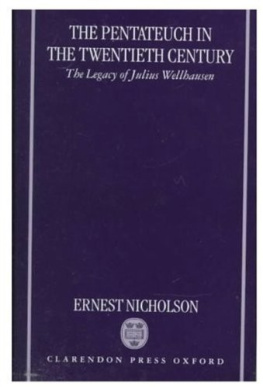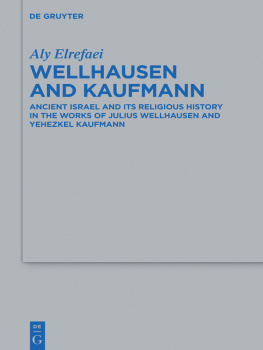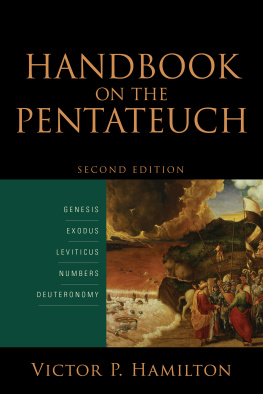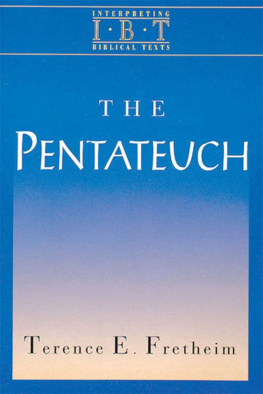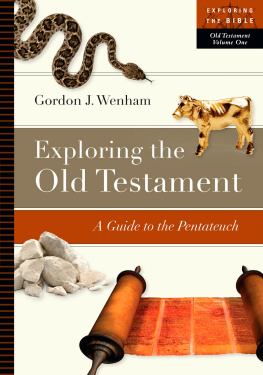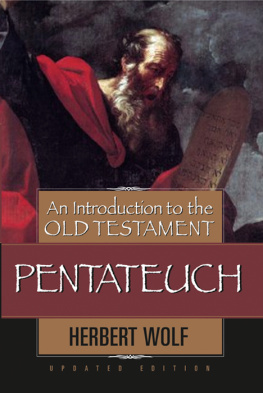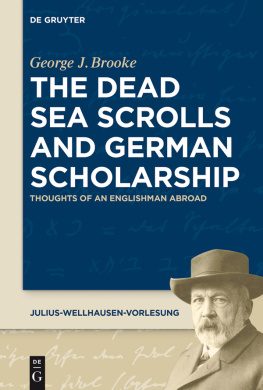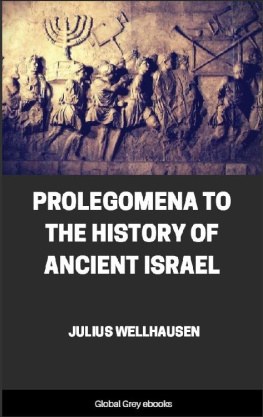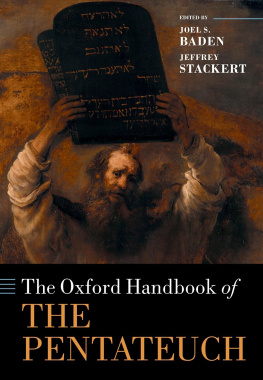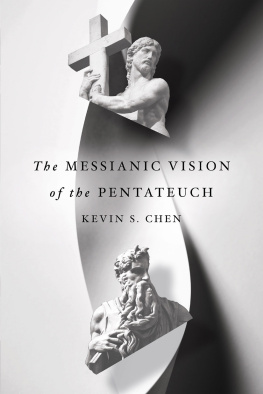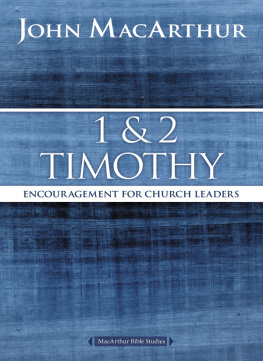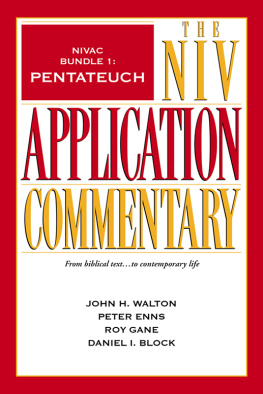The Pentateuch in the
Twentieth Century
The Legacy of Julius Wellhausen
ERNEST NICHOLSON
CLARENDON PRESS OXFORD
1998
-iii-
Oxford University Press, Great Clarendon Street, Oxford OX2 6DP
Oxford New York
Athens Auckland Bangkok Bogota Bombay
Buenos Aires Calcutta Cape Town Dar es Salaam
Delhi Florence Hong Kong Istanbul Karachi
Kuala Lumpur Madras Madrid Melbourne
Mexico City Nairobi Paris Singapore
Taipei Tokyo Toronto Warsaw
and associated companies in
Berlin Ibadan
Oxford is a trade mark of Oxford University Press
Published in the United States
by Oxford University Press Inc., New York
E. W. Nicholson 1998
All rights reserved. No part of this publication may be reproduced,
stored in a retrieval system, or transmitted, in any form or by any means,
without the prior permission in writing of Oxford University Press.
Within the UK, exceptions are allowed in respect of any fair dealing for the
purpose of research or private study, or criticism or review, as permitted
under the Copyright, Designs and Patents Act, 1988, or in the case of
reprographic reproduction in accordance with the terms of the licences
issued by the Copyright Licensing Agency. Enquiries concerning
reproduction outside these terms and in other countries should be
sent to the Rights Department, Oxford University Press,
at the address above
British Library Cataloguing in Publication Data
Data available
Library of Congress Cataloging in Publication Data
The Pentateuch in the twentieth century: the legacy of
Julius Wellhausen / Ernest Nicholson.
Includes bibliographical references and index.
1. Bible. O.T. Pentateuch--Criticism, interpretation, etc.
2. Documentary hypothesis (Pentateuchal criticism). 3. Wellhausen,
Julius, 1844-1918--Contributions in Biblical interpretation. I. Title.
BS1225.2N53 1998 222'.1066--dc21 97-35695
ISBN 0-19-826958-7
1 3 5 7 9 10 8 6 4 2
Typeset by Hope Services (Abingdon) Ltd.
Printed in >Great Britain
on acid-free paper by
Biddles Ltd.,
Guildford & King's Lynn
-iv-
PREFACE
There are problems in biblical studies which are so complex that they seem never to find an agreed resolution, yet which are so fascinating that scholars never give up the quest. Such is the 'Synoptic Problem' in the study of the Gospels; and such also is the question of the origins of the Pentateuch. Despite innumerable studies from at least the time of the Reformation, it was not until little more than a century ago that one hypothesis, the so-called 'Documentary Theory' formulated by Julius Wellhausen, established itself as the point of departure for all subsequent study of this topic. And even that represented only a pause for reflection, for it was not long before new approaches first supplemented, and then threatened to oust Wellhausen's great theory.
This book is an attempt to re-evaluate the Documentary Theory in the light of the vast literature that has appeared on the Pentateuch since it was first put forward. The first three chapters examine the work of form critics and traditio-historical critics who sought to build on Wellhausen's achievement but asked new questions about (for example) the oral traditions underlying the four 'sources' (JEDP) identified by Wellhausen, and the process by which they came to be incorporated into written documents. This material is familiar to scholars, but it will be useful for students of the Old Testament, and in any case is necessary if the newer developments surveyed in subsequent chapters are to be properly understood. For, as these chapters go on to show, in the last twenty-five years the study of the Pentateuch has been once more in turmoil. Rather than attempting to supplement Wellhausen's hypothesis, recent studies have either endeavoured to investigate the Pentateuch from scratch, or else to challenge almost every conclusion to which Wellhausen and those who followed him came concerning the date, origin, integrity, and nature of the sources. Not only are modern works of the origins of the Pentateuch challenging and provocative, however; they are usually also long, densely technical, and often in German. One intention of the present book is to make these discussions available in a clear and readable way to students of the Old Testament.
But the objective is not to provide merely a neutral 'state of the art'
-v-
report. The book arises from conviction that much in current Pentateuchal research needs to be subjected to rigorous scrutiny and that much, indeed, is radically mistaken. The work of Wellhausen, for all that it needs revision and development in detail, remains the securest basis for understanding the Pentateuch. As the reader will see from the conclusions, however, this is not a mere call to go 'back to Wellhausen', for much in the intervening debate has significantly modified his conclusions, as well as asking questions that were not on his agenda. But the Documentary Hypothesis should remain our primary point of reference, and it alone provides the true perspective from which to approach this most difficult of areas in the study of the Old Testament.
A number of colleagues and friends have helped and advised me in writing this book. I am specially grateful to Hugh Williamson and John Barton for the interest they have taken throughout its preparation and for reading and commenting on various drafts. Their support has been invaluable. My thanks are due also to James Barr who read through the final typescript and made numerous helpful suggestions for its improvement. I enjoyed the benefit of many conversations with Graham Davies about various topics discussed in the book. His help too has been indispensable. Simon Hornblower, Fellow in Ancient History at Oriel College, has been a constant source of encouragement, and I am especially indebted to him for advice in the discussion of Israelite compared with Greek historiography. William Johnstone, John Day, and John Emerton have also come to my help in a number of key topics of debate, and I express my thanks to them also. I am very considerably indebted to the Librarian at the Faculty of Theology in Oxford, Susan Lake. I have also had the invaluable assistance here at Oriel College of Yvonne Scott, Anita Dean, and Lynn Ellwood.
Ernest Nicholson
Oriel College, Oxford
Easter 1997
-vi-
CONTENTS
| List of Abbreviations | viii |
| PART I: FROM JULIUS WELLHAUSEN TO MARTIN NOTH |
| 1. | The Documents of the Pentateuch |
| 2. | Behind the Documents of the Pentateuch |
| 3. | From Tradition to Literature |
PART II: THE PROBLEM OF THE PENTATEUCH IN
CURRENT RESEARCH |
| 4. | The Theory Under Attack: Rolf Rendtorff's New
Paradigm of the Origin of the Pentateuch |
| 5. | Attempts to Redate the 'Yahwist' |
| 6. | New Proposals Concerning the First Tetrateuch and its
Sources |
| 7. | Renewed Debate about P |
| 8. | The Documentary Theory Revisited |
| 9. | Understanding the Final Form of the Pentateuch |
| Bibliography |
| Author Index |
| Index of Scripture References |
-vii-
ABBREVIATIONS
| AThANT | Abhandlungen zur Theologie des Alten und Neuen
Testaments |
| ATD | Das Alte Testament Deutsch |
| BBB | Bonner biblische Beitrge |
| BKAT | Biblische Kommentar: Altes Testament |
| BN |

